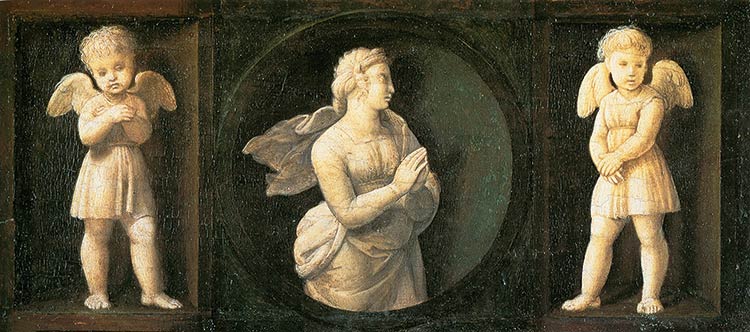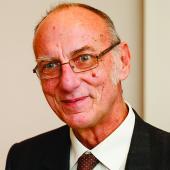Each person finds hope within themselves*
Among the living beings, man seems to be the only one made happy by hope, who exalts himself with joy thinking of the reason that might put him in the condition of possessing a desired thing, but he is also the only one to weep when he discovers all hope is lost.

Speranza Raffaello Sanzio olio su tela Pinacoteca Vaticana Roma
The mere probability of achieving his desires (or what he seems to desire) is enough for his imagination to please itself in multiplying and esteeming beyond measure the pleasures that might derive from the very same.
In this way the soul is enthused towards pursuing the good it aspires to.
We do not invent, hence neither do we execute anything if not to fulfil our wishes. But on looking closer, we find there is nothing of the present in the sensations that we feel and that the object of our pleasures is forever placed in the future.
One could though sustain that he who hopes enjoys; that man’s happiness is placed in the enticement of what awaits us.
«..And happiness and pleasure are always future, that is they do not exist, nor could they really exist, if not only in the desires of the living being, and in the hope or expectation that follows», writes the implacable Leopardi.
Hope, though, procures the sensations most cherished to the heart, because the soul loves all that pleases it to act. This means that the imagination continues to level all obstacles and that man, counting on his own fortune, is more inclined to act.
Against this though, one might say that hope is a mendacious dream, useful for nothing other than to deceive us.
Not infrequently man passes an entire lifetime in the hope of good that he will never attain, and desires that are incessantly reborn, make him impatient and reckless beyond all reason.
So, whether all that constitutes our well-being derives from this passion, whether it be a vain and illusory feeling, hope appears to be the prerogative of a world in which happiness is not lasting.
Seneca admonishes: «Do not hope without despair and do not despair without hope».
Because, after all, fear always accompanies hope, as if to dampen its impetus and lessen its attractiveness. Also because, experience teaches that dashed hopes are followed by the saddest despondency.
Thus man always finds himself in uncertainty, before the good he hopes for and the evil he fears.
Is not he who wants to have everything on earth unfortunate? And is not doubt of reasonableness useful to man in giving a rule to the vain desires that torment him?
Whichever way one looks at it, hope is in every way the principle of movement and the motor of all the efforts made by men to preserve themselves on earth.
It is our sensitive divinity, and without hope we would not be able to conquer the evils that surround us and we would not know how to achieve virtue and good.
Perhaps this is why someone wrote: “He who gave all he had, and who retained for himself nothing but hope, did not reserve such a small part as it might seem: on the contrary he took for himself the sweetest thing in life, and among the good that can be found there he chose the most enduring.
* Virgilio
Eneide, Libro XI-309















